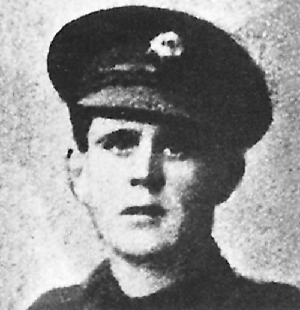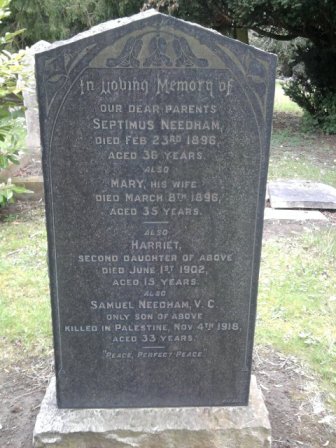The Bedfordshire Regiment in the Great War

Samuel NEEDHAM, V.C.

I have been unable to identify a service record for Sam Needham, so presume it was among those lost in the Blitz. In the absence of a service record, below represents the best biogaphy I am able to produce about Sam's life and service.
Samuel Needham was born in Great Limber, Lincolnshire on 16 August 1885, to Septimus and Mary Needham. Six years later the 1891 census shows the family living at Anderson Street in the centre of Grimsby; his parents were to both die young - Septimus died aged 36 on 23 February 1896 and Mary aged 35 just 2 weeks later, on 8 March 1896. One of his sisters - Harriet - died aged just 15, in 1 June 1902. Sam's surviving sisters as at 1919 were listed as Florence (later Florence Baron), Elizabeth, Elsie (later Elsie Jamieson) and Dora (later Dora Betts). The 1891 census also refers to Mary and Florence who presumably were going by their middle names of Elsie and Dora by 1919.

By the 1901 census, Sam was a 15 year old Groom living in Lincoln Lindsey, north of Caistor and by the 1911 census he was a Stableman living in Lound Retford. The Hull Times recorded that his father was one of Lord Yarborough's grooms and Sam was to follow in his fathers footsteps. When Sam left the Brockesby Stables, he worked in several other hunting stables, including the Duke of Westminster's and the Earl of Fitzwilliam's.
When war broke out in August 1914, Sam was recorded as living with his married sister (Mrs Florence Baron) at 6 Astley Street in Hull. Presumably his interest in and experience with horses led him to enlist as Private RTS/5023 in the Army Service Corps and he went to France on 13 January 1915. Having been wounded or taken ill and recovered in England, he was transferred into the Bedfordshire Regiment as Private 203329. Looking at the service numbers around his, it would appear he joined the regiment at the very end of 1916. The Grimsby News recorded that he "went out to Egypt" in January 1917 so would have physically joined the 1st/5th Battalion in Palestine soon afterwards, at the time when the Brtish and Commonwealth forces marched along the coastal road to assault the city of Gaza.
The Grimsby News adds that "his friends and relatives know very little of his military career" but Sam would have been with the battalion during the three Battles of Gaza in 1917, the Umbrella Hill raids of July 1917 and the operations between late 1917 and spring 1918.
Although spring 1918 saw major operations in that theatre of war paused in response to the threat posed by the German Spring Offensives on the Western Front in March 1918, they resumed late that summer. Sam was part of an overnight fighting patrol sent into the night with the intention of establishing where the Ottoman forces had set up their defensive lines during their retirement. Bumping into a significantly stronger force, the patrol took heavy casualties and was in very real danger of being overwhelmed and annihilated early on 11 September 1918. Private Needham's complete disregard for his own personal safety and "berserk fury" saved his patrol from certain destruction.
An extract from The London Gazette, dated 29 October 1918, records his citation:
"For most conspicuous bravery and initiative when with a strong patrol which was heavily attacked by the enemy and forced back in confusion. At this critical moment Private Needham ran back and fired rapidly at a body of the enemy at point-blank range. His action checked the enemy and enabled the patrol commander to reorganise his men. The patrol had many casualties, but successfully got back all their wounded, and it was due to the action of individuals, of which this is the most outstanding, that the entire patrol was not cut off. Pte. Needham's example was of the greatest value at a critical moment, and the bold and determined stand made by him did more than anything to inspire confidence, and undoubtedly saved a critical situation."
Page 232 of Captain F.A.M. Webster's book 'The History of the Fifth Battalion Bedfordshire and Hertfordshire Regiment (TA)' says:
'At one stage of operations on the Bureid Ridge, one of Captain Yarde's patrols suddenly bumped into a very much stronger Turkish patrol and, when our men were getting demoralised by our casualties, Private S Needham, who was a miner from Hull, saved the situation and won the Victoria Cross. He charged the enemy single handed and, fighting like one possessed, accounted for many Turks. His berserk fury created such a diversion in the darkness and confusion that, for the moment, the enemy was checked and themselves gave way before him. His comrades were unanimous in thinking that Private Needham's action enabled them to get away, otherwise they would have all been surrounded and cut off. Had this happened the valuable information that Captain Yarde brought back would not have been available for further operations. It should be noted that Captain Yarde himself won a bar to his MC on this occasion.' (See here for information on Captain Yarde, MC and Bar).
With an irony that so often befalls the tallest of heroes, Sam survived the entire war died on 4 November 1918 - a few days after the Armistice was agreed in his theatre of war.
According to a privately printed pamphlet detailing the life of Samuel, he died from a gunshot wound to his head received whilst at No. 1 Base Depot in Kantara. His Wikipedia entry records that Sam took his own life, referring to his Death Certificate as the source.
Chris Bailey was kind enough to send me the below article from the Hull Times. Given the time between him winning his V.C., the award being granted, it appearing in the papers and his death, the article must have been only a matter of days or perhaps weeks before his sister was to learn of his death.

In 1956, one of his sisters - Mrs Edward Baron from Hull - donated Sam's VC medals group to the Bedfordshire and Hertfordshire Regimental Museum. All that is known about his surviving family at the moment is that Sam himself was single and that he had four sisters. Other than Mrs Baron who lived at Astley Street in Hull at the time of Sam's death, another was a cook in Sir Alec Black's household and the third surviving sister had moved to Canada.
Site built by Steven Fuller, 2003 to 2023